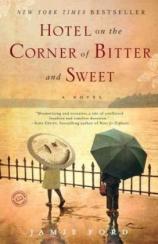Hotel on the Corner of Bitter and Sweet
Review
Hotel on the Corner of Bitter and Sweet
The hotel in the title of Jamie Ford's debut novel is not just "on the corner of bitter and sweet"; it is also on the boundary between the predominantly Chinese and Japanese neighborhoods in Seattle. To outsiders, the demarcations between "Chinatown" and "Japantown" might not be readily apparent. But to those who lived there during World War II, they might as well have been two different countries.
Henry Lee is swept back to those times by one evocative image, as, in 1986, he stands outside the old Panama Hotel, which is undergoing renovations. As workers bring steamer trunks, boxes and paraphernalia out of the basement, Henry glimpses a Japanese bamboo parasol, the sight of which takes him back to 1942.
Henry is now in his mid-50s, a widower and an old man in his own mind. But in 1942 he was just 12, often confused by the baffling changes sweeping across the world, the country and even his own neighborhood. The son of Cantonese-speaking Chinese immigrants, Henry has received a prestigious scholarship to a private school, where he is the only non-white student. That is, until Keiko Okabe, a beautiful young Japanese-American girl, joins his class.
The two form a fast friendship, bonding over shared work hours in the school cafeteria and a love of music and adventure. Henry knows that his father, a vehement Chinese nationalist, would be shocked and horrified if he knew about Henry's friendship with a girl of Japanese descent. He also realizes that Keiko and other Japanese Americans are the targets of racial hatred in these intense weeks and months following the bombing of Pearl Harbor. But when Keiko's family, along with all the other families of Japanese descent on the West Coast, are ordered into internment camps, Henry must decide for himself where to construct the boundaries between nationalities, if at all.
In brief chapters, many of which merely recount a single anecdote, readers travel back and forth in time, between Henry's youthful past, when he first found both love and independence, and his middle-aged present, when he witnesses first-hand the easier love between his own college-aged son and his non-Asian fiancée.
Ford deftly probes the complex relations among Japanese, Chinese, whites and blacks during the paranoid, intense months shortly after the U.S. entered World War II. Henry's 12-year-old self is occasionally too perceptive, too self-aware to be entirely convincing as the voice of a child; one wonders whether it would have been better to have Henry and Keiko be somewhat older teens or young adults in 1942, thereby allowing the romantic relationship that is only hinted at here to flourish more freely and to allow Henry's youthful voice to be more authentically mature. Ford's decision to keep them as preteens, however, leaves the door open for an optimistic, romantic future for the middle-aged Henry Lee, ensuring that there is more than enough "sweet" to balance out the "bitter."
Reviewed by Norah Piehl on January 30, 2009
Hotel on the Corner of Bitter and Sweet
- Publication Date: October 6, 2009
- Genres: Fiction
- Paperback: 301 pages
- Publisher: Ballantine Books
- ISBN-10: 0345505344
- ISBN-13: 9780345505347










